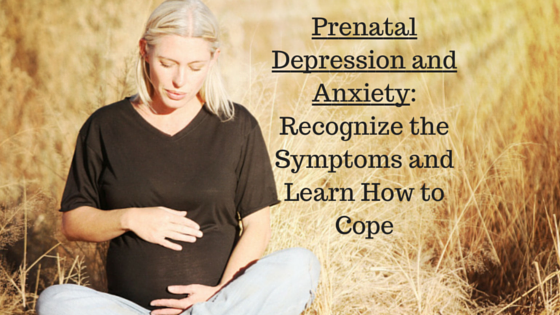Aimee touched her pregnant belly. She wasn’t sure about any of this.
She didn’t feel ready. She didn’t even really feel excited most of the time. She didn’t feel any of the ways she was sure she was supposed to feel.
And she didn’t understand why. She had wanted to be a mother. She had chosen to be a mother.
But she was constantly worried. She was restless. She could barely sleep at night. Some nights Aimee cried herself to sleep, but didn’t know why.
Nobody had ever mentioned prenatal depression or anxiety to her.
Her mom told her it was “just hormones.” Her friends told her to “just relax.” Everyone told her she’d “be just fine.”
But her mind told her differently. Her thoughts bounced constantly between fear and sadness.
“What if I’m not a good mom?” she thought. “What if my partner is disappointed in me? What if something is wrong my baby? What if I can’t handle giving birth? I just don’t think I can do this.”
Aimee wanted to feel the joy she’d always imagined would accompany pregnancy. What was going on?
If you are pregnant, and you ever feel like Aimee, you, too, may be suffering from prenatal depression or anxiety. And you are not alone.
In fact, some studies suggest that more women suffer from prenatal anxiety and depression than postpartum anxiety and depression.
You don’t have to keep suffering. And you don’t have to suffer alone.
Let’s look at some of the symptoms, and some strategies for relief:
Symptoms of Prenatal Depression and Anxiety
- Persistent sense of guilt or worthlessness
- Withdrawal, or feeling nothing at all
- Deep sadness, tearfulness
- Lack of focus, or worried energy
- Deep lack of energy
- Unrelenting worry (i.e. about your baby’s health)
- Fear of abandonment by your partner
- Strong emotions regarding your own upbringing
- Shame about seeking help
- Deeply disrupted sleeping or eating patterns
- Lost interest in formerly-pleasurable activities
- Recurring hopelessness
- Irritation or agitation
- Compulsive thoughts or behavior
Prenatal depression and anxiety symptoms generally persist for two weeks or more, though the experience varies widely. You needn’t feel ashamed or guilty if you find that your depression or anxiety lasts much longer.
Coping with Prenatal Depression and Anxiety
Several factors may complicate your ability to manage prenatal depression and require help to cope:
- A lack of societal awareness. Until recently, prenatal depression was largely unrecognized and chalked up to hormonal upheaval. Fortunately, there are more therapists today who are trained to help. Talk to a loved one or your health care provider about finding appropriate care. Do this as soon as possible, so your prenatal depression or anxiety does not persist.
- A lack of personal support. Often mothers who didn’t experience pregnancy-related mood problems are unable to relate to your feelings. So too, older generations of mothers may not have heard of these issues and may have a tendency to dismiss your depression or anxiety as something to get over or push through. It’s okay to reach out to a support group or qualified therapist for help.
- A lack of practical resources. If you are alone, balancing pregnancy and work, or dealing with limited finances, the help of others is crucial. Seek out job-sharing programs at work, government assistance, and support groups – in person, or online – to ease your burdens throughout your pregnancy and beyond.
Other ways to cope with prenatal depression and anxiety:
- Medication or holistic remedies. Antidepressants and antianxiety medications may be helpful when prescribed by your doctor, and risks need to be weighed carefully. Ask your doctor about other possible holistic remedies that might also safely relieve stress and help stabilize your mood.
- Acupuncture. Studies indicate that many women dealing with prenatal depression and anxiety respond well this natural, alternative treatment. Always seek the advice of your health care provider first, and always choose an acupuncturist who specializes in pregnancy.
- Self-care. Meeting your own mental, emotional, spiritual, and physical needs isn’t selfish or unnecessary. Adequate sleep and a diet rich in mood-boosting supplements, such as Omega-3 fish oils, may help stabilize your mood. Again, always check with your health care provider before taking any supplements during pregnancy. Also, seek support with the care of your other children and commit to regular exercise. Take time for a pregnancy massage, a yoga class, journaling, or meditation. Show yourself some compassion and honor your body and mind.
- Partner participation. Try to draw closer to your partner, if you have one. Your partner isn’t physically carrying your child, but should be given every opportunity to share your pregnancy ups and downs as well as support you through the experience.
You should know that at least 10 percent of pregnant women are trying to manage prenatal depression or anxiety, just like you. Share your fears and worries with someone you trust.
You can come to terms with your feelings and have a more peaceful pregnancy.
Call a professional soon and secure the best help for you and your child.
For more information on Postpartum Depression Treatment click here.







Leave A Comment